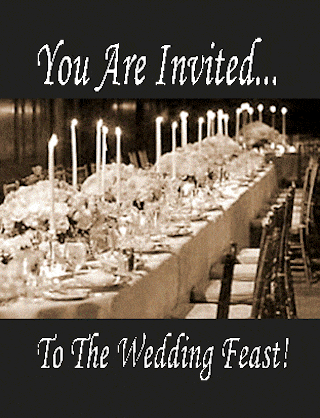 The Pharisees were always trying to trap Jesus into something and Matthew 19 showed how much they also disliked eunuchs.
The Pharisees were always trying to trap Jesus into something and Matthew 19 showed how much they also disliked eunuchs.
Jesus wasn’t an evangelist or preacher or anything like that, He didn’t even have a church (He is the head of the church – Col 1:18).
As far as we know from the Bible He just went around teaching and healing people. He probably spent most of His time doing that in Jerusalem and Capernaum. But tomorrow we’ll look more into…
Matthew 22
The Marriage Dinner
1 And Jesus answered and spake unto them again by parables, and said,
2 The kingdom of heaven is like unto a certain king, which made a marriage for his son,
3 And sent forth his servants to call them that were bidden to the wedding: and they would not come.
4 Again, he sent forth other servants, saying, Tell them which are bidden, Behold, I have prepared my dinner: my oxen and my fatlings are killed, and all things are ready: come unto the marriage.
5 But they made light of it, and went their ways, one to his farm, another to his merchandise:
6 And the remnant took his servants, and entreated them spitefully, and slew them.
7 But when the king heard thereof, he was wroth: and he sent forth his armies, and destroyed those murderers, and burned up their city.

8 Then saith he to his servants, The wedding is ready, but they which were bidden were not worthy.
9 Go ye therefore into the highways, and as many as ye shall find, bid to the marriage.
10 So those servants went out into the highways, and gathered together all as many as they found, both bad and good: and the wedding was furnished with guests.
11 And when the king came in to see the guests, he saw there a man which had not on a wedding garment:
“Had not on a wedding garment” – it has been conjectured that it may have been the custom for the host to provide the guests with wedding garments. This would have been necessary for the guests at this feast in particular, for they were brought in directly from the streets.
The failure of the man in question to avail himself of a wedding garment was therefore an insult to the host, who had made the garments available.
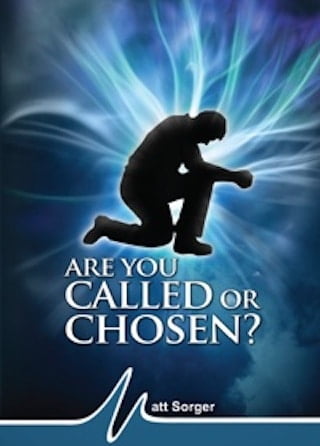
Just as He chose us in Him before the foundation of the world, that we should be holy and without blame before Him in love, having predestined us to adoption as sons by Jesus Christ to Himself, according to the good pleasure of His will, to the praise of the glory of His grace, by which He made us accepted in the Beloved.
12 And he saith unto him, Friend, how camest thou in hither not having a wedding garment? And he was speechless.
13 Then said the king to the servants, Bind him hand and foot, and take him away, and cast him into outer darkness; there shall be weeping and gnashing of teeth.
14 For many are called, but few are chosen.
A proverbial summary of the meaning of the parable. God invites “many” (perhaps “all” in view of the Semitic usage of “many”) to be part of His kingdom, but only a “few” are chosen by Him.
This does not mean that God chooses arbitrarily. The invitation must be accepted, followed by appropriate conduct. Proper behavior is evidence of being chosen.
15 Then went the Pharisees, and took counsel how they might entangle him in his talk.
22:15-17 – the Pharisees were ardent nationalists, opposed to Roman rule, while the Herodians, as their name indicates, supported the Roman rule of the Herods. Now, however, the Pharisees enlisted the help of the Herodians to trap Jesus in His words.
After trying to put Him off guard with flattery, they sprang their question: “Is it lawful to give tribute unto Caesar (Tiberius Caesar Augustus), or not?” (v. 17). If He said “No,” the Herodians would report Him to the Roman governor and He would be executed for treason.
If He said, “Yes,” the Pharisees would denounce Him to the people as disloyal to His nation.
16 And they sent out unto him their disciples with the Herodians, saying, Master, we know that thou art true, and teachest the way of God in truth, neither carest thou for any man: for thou regardest not the person of men.
17 Tell us therefore, What thinkest thou? Is it lawful to give tribute unto Caesar, or not?
18 But Jesus perceived their wickedness, and said, Why tempt ye me, ye hypocrites?
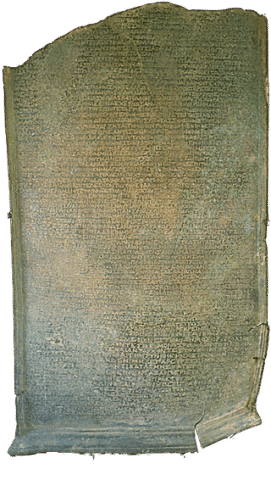
The “Laws of Caesar”
~ Treaty of Friendship and Reciprocal Military Alliance Between the Roman People and the Lycian Federation, including the Criminal ‘Laws of Caesar,’ International Law, and Law of Jurisdiction. ~
The treaties between the Romans and their allies were the cornerstones of the Roman Empire, and were one of the main causes of their military success and stability over centuries.
19 Shew me the tribute money. And they brought unto him a penny.
“Penny” – The denarius, the common Roman coin of that day. On one side was the portrait of Emperor Tiberius and on the other the inscription in Latin: “Tiberius Caesar Augustus, son of the divine Augusts.” The coin was issued by Tiberius and was used for paying tax to him.
20 And he saith unto them, Whose is this image and superscription?
21 They say unto him, Caesar’s. Then saith he unto them, Render therefore unto Caesar the things which are Caesar’s; and unto God the things that are God’s.
“Unto God the things that are God’s” – in distinguishing clearly between Caesar and God, Jesus also protested against the false and idolatrous claims made on the coins.
22 When they had heard these words, they marveled, and left him, and went their way.
23 The same day came to him the Sadducees, which say that there is no resurrection, and asked him,
24 Saying, Master, Moses said, If a man die, having no children, his brother shall marry his wife, and raise up seed unto his brother.
Moses said” – Jesus quoted from the Pentateuch when arguing with the Sadducees, since those books had special authority for them.
The reference (Deut 25:5-6) is to the levirate law (from Latin levir, “brother-in-law”), which was given to protect the widow and guarantee continuance of the family line.
25 Now there were with us seven brethren: and the first, when he had married a wife, deceased, and, having no issue, left his wife unto his brother:
22:25-40 – the Sadducees was an aristocratic, politically minded group, willing to compromise with secular and pagan leaders. They controlled the high priesthood at this time and held the majority of the seats in the Sanhedrin.
They did not believe in the resurrection or an afterlife, and they rejected the oral tradition taught by the Pharisees (Josephus, Antiquities, 13.10.6).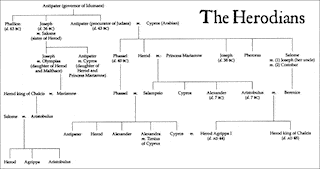
26 Likewise the second also, and the third, unto the seventh.
27 And last of all the woman died also.
28 Therefore in the resurrection whose wife shall she be of the seven? for they all had her.
29 Jesus answered and said unto them, Ye do err, not knowing the scriptures, nor the power of God.
30 For in the resurrection they neither marry, nor are given in marriage, but are as the angels of God in heaven.
31 But as touching the resurrection of the dead, have ye not read that which was spoken unto you by God, saying,
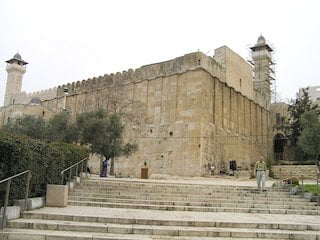
Herodian architecture is a style of classical architecture characteristic of the numerous building projects undertaken during the reign (37 B.C. – 4 B.C.) of Herod the Great, the Roman client king of Judea.
Herod undertook many colossal building projects, most famously his reconstruction of the Temple in Jerusalem (ca. 19 B.C.). Many of his structures were built upon comparable, previous Hasmonean buildings and most of his have, in their turn, vanished as well.
32 I am the God of Abraham, and the God of Isaac, and the God of Jacob? God is not the God of the dead, but of the living.
33 And when the multitude heard this, they were astonished at his doctrine.
34 But when the Pharisees had heard that he had put the Sadducees to silence, they were gathered together.
35 Then one of them, which was a lawyer, asked him a question, tempting him, and saying,
36 Master, which is the great commandment in the law?
37 Jesus said unto him, Thou shalt love the Lord thy God with all thy heart, and with all thy soul, and with all thy mind.
22:37, 39 – “Love” – the Greek verbs is not phileo, which expresses friendly affection, but agapao, the commitment of devotion that is directed by the will and can be commanded as a duty.
“With all thy heart…soul…mind” – with your whole being. The Hebrew of Deut 6:5 has “heart…soul…might,” but some manuscripts of the Septuagint (the Greek translation of the Old Testament) add “mind.” Jesus combined all four terms in Mk 12:30.
38 This is the first and great commandment.
39 And the second is like unto it, Thou shalt love thy neighbor as thyself.
40 On these two commandments hang all the law and the prophets.
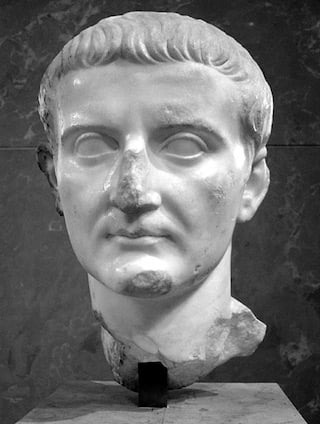
“All the law and the prophets” – the entire Old Testament.
41 While the Pharisees were gathered together, Jesus asked them,
22:41-46 – Most of the people knew that the Messiah was to be from the family of David.
42 Saying, What think ye of Christ? whose son is he? They say unto him, The Son of David.
43 He saith unto them, How then doth David in spirit call him Lord, saying,
44 The LORD said unto my Lord, Sit thou on my right hand, till I make thine enemies thy footstool?
45 If David then call him Lord, how is he his son?
46 And no man was able to answer him a word, neither durst any man from that day forth ask him any more questions.
The True King Riding on a Donkey
Jesus’ entrance into Jerusalem on Palm Sunday represents one of the most significant public events of his ministry. Each of the four Gospels records this incident, though with distinctive details (Matt 21:1-11; Mk 11:1-10; Lk 19:29-38; Jn 12:12-15).
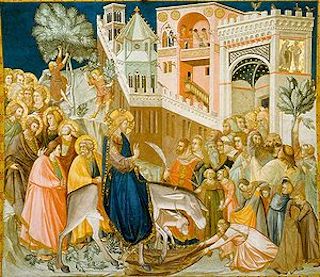
Central to each report is Jesus’ deliberate choice to enter the city riding upon a donkey. Scholars have noted three significant points regarding this chosen mount. These aspects are not mutually exclusive, and each contributes to a more complete appreciation of the meaning of Jesus’ symbolic action and its decisive consequences:
– The donkey was a traditional mount for kings and rulers in the ancient Near East (Jdg 10:4; 12:14; 2Sa 16:2); Jesus was therefore making an implicit claim to be the king of his people.
– The act of riding into Jerusalem on a donkey near the time of the Passover celebration invoked a central image of Messianic expectation, linked to key Biblical texts such as Gen 49:10, Is 62:11; Zech 9:9.
Two of the four Evangelists explained the significance of Jesus’ entrance explicitly as the fulfillment of Scripture (Matt 21:5; Jn 12:15). In Jewish literature and teaching, moreover, the image of a king on a donkey approaching Jerusalem was consistently understood to signify the arrival of the Messianic King.

Thus, Jesus was claiming to be the Messiah and proclaiming that the restoration was dawning through His own person.
– In light of the frequent Old Testament association of horses with war and human pride, the donkey may have presented an image of peaceful humility. Jesus, in this interpretation, was making a statement regarding the nature of his kingship (cf. Deut 17:16; 2 Sam 15:1; Ps 20:6-9, 33:16-18, 147:10-11; Prov 21:31; Zech 9:9-10).
…the synagogue in Capernaum.
Visits: 0

